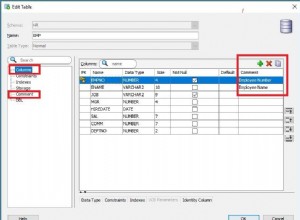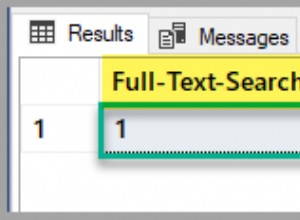Đây là một trong số ít lần con trỏ thực sự lý tưởng trong SQL Server. Đây là một cách. Khi bạn nhìn thấy câu lệnh PRINT và hài lòng, bạn có thể bình luận nó ra và bỏ ghi chú hai dòng bên dưới nó. Tôi đưa một số logic vào để thêm tên tệp và ngày xử lý thường là cần thiết, nhưng định nghĩa bảng của bạn sẽ cần các cột này. Nó sẽ có được ý tưởng xuyên suốt.
---------------------------------------------------------------------------------------------------------------
--Set some variables
---------------------------------------------------------------------------------------------------------------
DECLARE @dt VARCHAR(10) --date variable but stored as VARCHAR for formatting of file name
DECLARE @fileLocation VARCHAR(128) = 'E:\DATA_TRANSFERS\' --production location which is \\issqlstd01 but the xp_dirtree didn't like this
DECLARE @sql NVARCHAR(4000) --dynamic sql variable
DECLARE @fileName VARCHAR(128) --full file name variable
---------------------------------------------------------------------------------------------------------------
--Get a list of all the file names in the directory
---------------------------------------------------------------------------------------------------------------
IF OBJECT_ID('tempdb..#FileNames') IS NOT NULL DROP TABLE #FileNames
CREATE TABLE #FileNames (
id int IDENTITY(1,1)
,subdirectory nvarchar(512)
,depth int
,isfile bit)
INSERT #FileNames (subdirectory,depth,isfile)
EXEC xp_dirtree @fileLocation, 1, 1
---------------------------------------------------------------------------------------------------------------
--Create a cursor to fetch the file names
---------------------------------------------------------------------------------------------------------------
DECLARE c CURSOR FOR
select subdirectory from #FileNames where isfile = 1
OPEN c
FETCH NEXT FROM c INTO @fileName
---------------------------------------------------------------------------------------------------------------
--For each file, bulk insert
---------------------------------------------------------------------------------------------------------------
WHILE @@FETCH_STATUS = 0
BEGIN
SET @sql = 'BULK INSERT Employee_Table FROM '''+ @fileLocation + @fileName +''' WITH (FIELDTERMINATOR = ''\t'',KEEPNULLS,ROWTERMINATOR = ''0x0a'')'
--Try the bulk insert, if error is thrown log the error
--Also update the Table Columns which aren't a part of the original file (load date and original file name)
BEGIN TRY
PRINT(@sql)
--EXEC(@sql)
--UPDATE Employee_Table SET OrigFile = @fileName, LoadDate = GETDATE() WHERE OrigFile IS NULL
END TRY
BEGIN CATCH
SELECT ERROR_MESSAGE()
END CATCH
FETCH NEXT FROM c INTO @fileName
END
CLOSE c
DEALLOCATE c
GO




